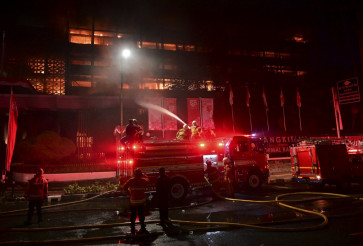Tradition to wake up neighbors for ‘sahur’ in decline
Children getting up in the middle of the night to wander around enthusiastically banging drums to wake up neighbors to take sahur (predawn meals) during the Ramadhan fasting month used to be a common experience for Greater Jakarta residents
Change text size
Gift Premium Articles
to Anyone

C
hildren getting up in the middle of the night to wander around enthusiastically banging drums to wake up neighbors to take sahur (predawn meals) during the Ramadhan fasting month used to be a common experience for Greater Jakarta residents.
Armed with their mothers’ cooking utensils, used cans, plastic bottles or anything else that can create noise, these children collaborate to orchestrate their music while shouting: “Sahur! Sahur!” Their racket would get even louder when they passed a house where the lights were off, as they would assume that the habitants had yet to wake up.
For the native Betawi, the tradition is called Ngarak Bedug (parading a big wooden drum). A group of youngsters put the drum on a cart and beat it while strolling around the neighborhood. They also play traditional Betawi music to enliven the parade.
The unique, age-old tradition, however, has begun to dissipate in recent years in the metropolis, with some residents saying they already miss it.
Dyah Puji Lestari, 24, said that she could no longer enjoy the tradition in either her house in Cipete, Pinang district in Tangerang, or at her workplace in Palmerah, West Jakarta, where she usually took the night shift.
“The tradition has been gradually disappearing since 2015. It was actually useful to wake us up,” she said, adding that before migrating to the capital in the early 2000s, the tradition was pervasive in her hometown of Kebumen, Central Java.
As a sign of gratitude, she said, she usually gave something to the group when the end of the fasting month neared.
Sahur is an important part of fasting because Muslims are still allowed to fill their stomachs during that particular hour before the dawn. After that, they have to wait until dusk to able to break their fast.
Putri Ade Olivia, 26, a resident of Wanasari subdistrict in Cibitung, Bekasi regency, said that the activity still existed thereabouts. However, the intensity had markedly decreased in the past few years.
“In the past, they used to play kentongan [traditional bamboo drums] and the music was easy on the ears. I think they were well trained,” she said. “Nowadays, it’s only once a week on the weekend and the rhythm is bad,” she said.
In other parts of Greater Jakarta, however, the tradition persists. On Jl. KS Tubun in Petamburan, Central Jakarta, for example, it is still a routine for children in the area.
“They usually start the activity at 2 a.m. and spend the night in a nearby mosque beforehand,” said 25-year-old Bela Puragasari.
Dave Lumenta, an anthropologist from the University of Indonesia (UI), said that the transformation and urban development of the megacity has affected the societal relations of its denizens and eroded the tradition.
“Living in a clustered housing complex guarded by security personnel is no longer exclusive for upper-class people. Middle-class people can also afford it. Children will of course feel uncomfortable to enter those area because they are not their play territories,” he said.
He added that the rapid development of technology had also influenced the lifestyles of the people and the function of the tradition had been replaced by more sophisticated methods, such as mobiles phones, alarm clocks and mosque megaphones.
Security during the morning twilight time has become a concern for the city administration. Acting Jakarta governor Djarot Saiful Hidayat has asked the police to take firm stance against residents holding outdoor predawn meals, also known as “sahur on the road,” during Ramadhan, saying they caused more harm than good.
The “sahur on the road” were actually aimed at distributing meals to the needy, but many people end up becoming unruly and vandalizing the streets.
Jakarta Police spokesperson Sr. Comr. Argo Yuwono said that while the police force would accede to the city administration’s demand to ban “sahur on the road, the force would not prohibit youth from waking up their neighbors.
“It’s not a problem and does not pose a threat. They usually carry out the activities in kampung anyway,” he said.









